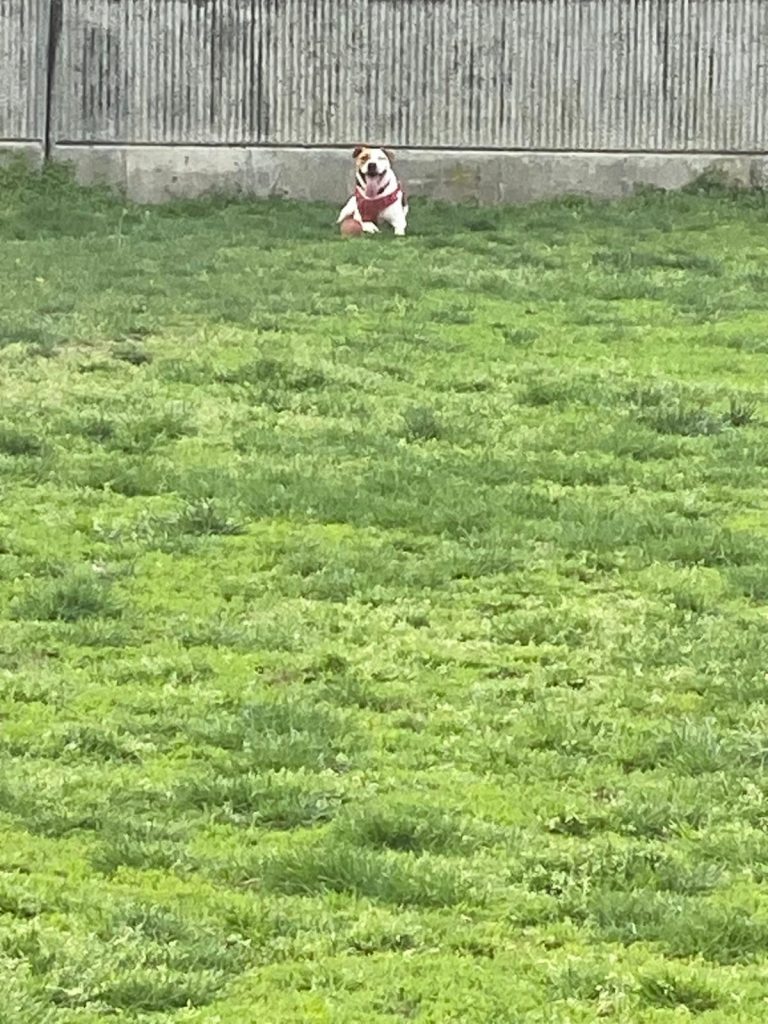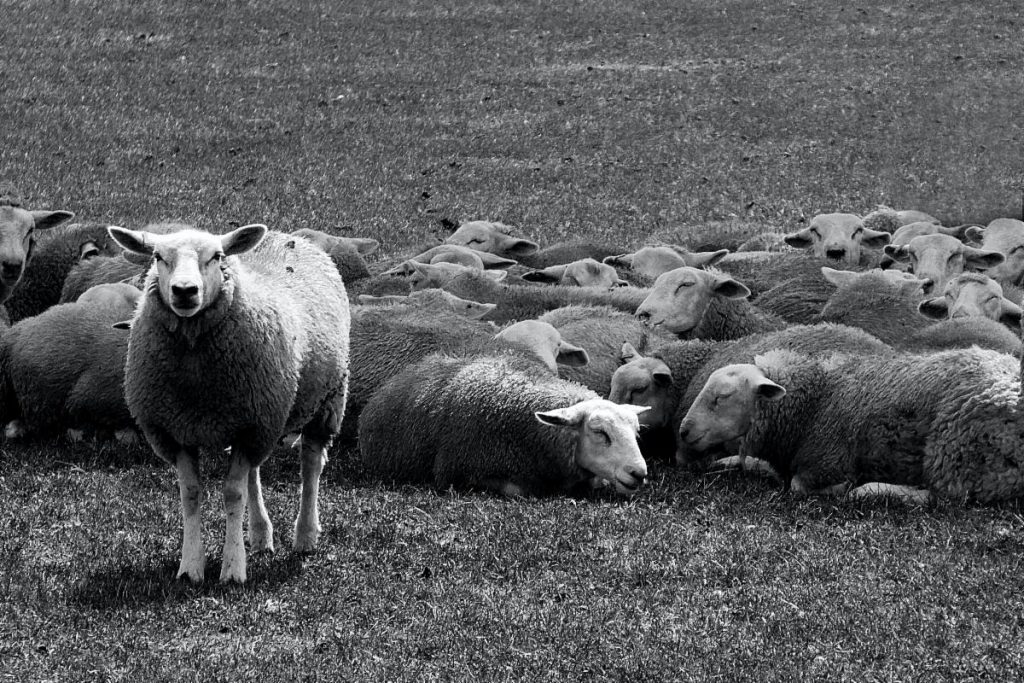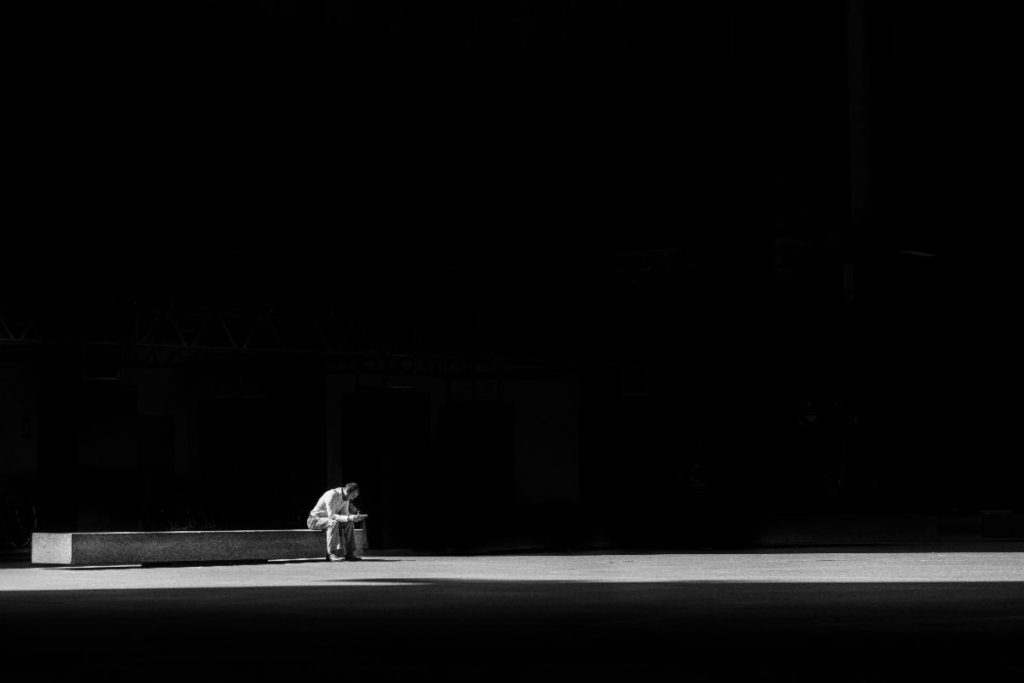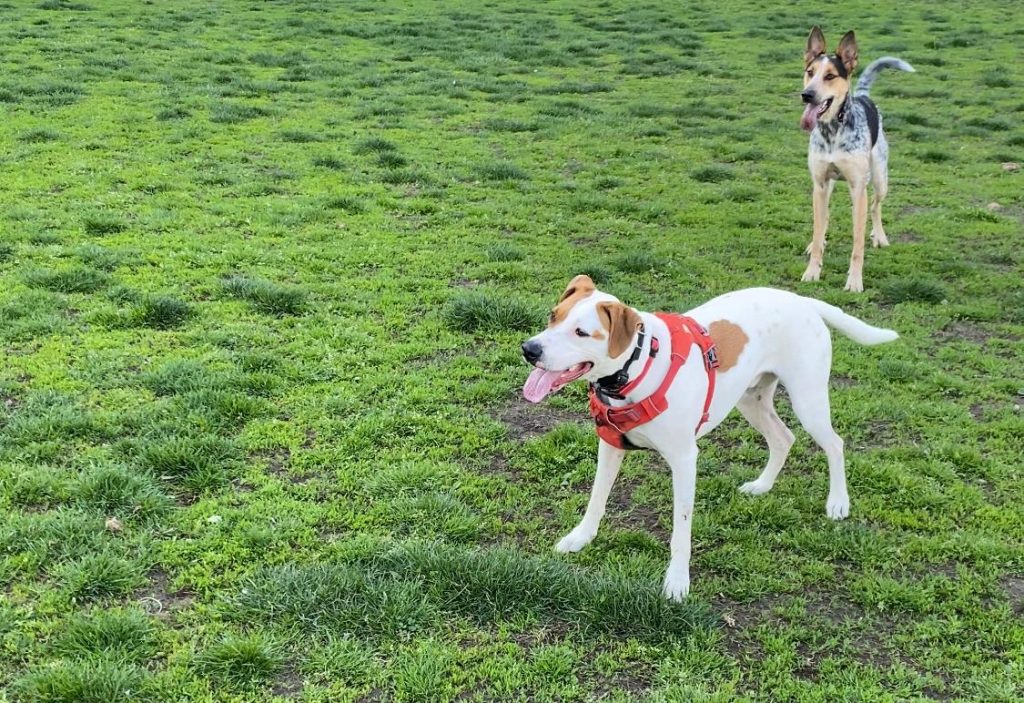I don’t think he learned it from Bill Gates.
(At least not directly).
But as I was reading through the next section of Essentialism, I couldn’t help but wonder about yet another quirky, self-taught aspect of Vlad’s behavior.
(And it’s one that’s escalated considerably now that the Brooklyn temperatures have suddenly hit the 80s.)
Namely, whenever he needs a break on the baseball field, he more or less benches himself.
Grinning madly, rather than returning the ball immediately for the next round of fetch as he does 99% of the time, Vlad suddenly decides to plop down, sequestering himself in the farthest corner of the outfield.

Vlad’s Self-Imposed Time Outs usually last for barely 1-3 minutes.
That’s all he needs to return refreshed and renewed, eager to fetch again until we’re eventually kicked off the field.
Unlike me, Vlad’s truly a master of knowing when he needs to step back so he can return to the game fully empowered.
And, fittingly, this is one of the techniques highlighted in the chapter entitled Escape: The Perks of Being Unavailable in Essentialism, the book I’m diving deep into as I explore this month’s theme of Clarity.
(Again, the new meditation is HERE)

Vlad understands––just as Bill Gates does–-that he needs to isolate himself in order to have a meaningful retreat.
Otherwise there’s simply too much (self-imposed) pressure to engage.
Apparently, the Microsoft co-founder has been taking twice a year “Think Weeks” since the 1980s, periods where he withdraws and reads books and articles and reflects on Tech and as well “The Big Picture.”
I find this practice of both Vlad and Bill Gates inspiring.
Unfortunately, whether we’re a puppy or a billionaire, it’s increasingly difficult for any of us to carve out time for this kind of “escape in order to focus.”
Indeed, it’s nearly impossible today not to suffer from Productivity Guilt.
And yet deep within I think we all know, as Picasso reminds us, that
“Without Great Solitude
No Serious Work is Possible.”

I’ve been exploring these kind of seeming paradoxes around Clarity, ones that Essentialismillustrates so well.
A major one is that the way to Clarity is created by maximizing rather than minimizingexploration.
To bare things down to the essential, we first have to thoroughly investigate all our options.
And yet when traveling down that path of exploration, its key activities––including solitude, play, and even sleep––are often dismissed as unnecessary or mere distractions.
Instead, they are absolutely vital on any true journey towards Clarity.
In fact, rather than hampering our productivity, they are its bedrock.
For example…

Having written the book and directed the DVD for Yoga In Bed (in what honestly seems like a lifetime ago), I remember well from all my sleep research just how essential getting good rest is.
As always, I’m delighted when celebrities agree.
Whether it’s Jeff Bezos’ prioritizing his sleep while running a business empire…
Or J. Lo’s “Sleep is my weapon” philosophy…
Or Winston Churchill’s midday nap ritual…
These famous folk are not fighting the science that’s proven how unwise it is to sacrifice sleep time just for more labor.
In fact, it’s a fool’s trade.
You might think you’re gaining more productivity hours when what you’re really doing is reducing your overall effectiveness while you’re awake.
Resting time (again paradoxically) is when our brains are actually engaged in vital work, making new neural connections as they encode and restructure information.
It’s perhaps analogous to rebooting your laptop when you install new software.
It takes a moment, in other words, for the upgrades to kick in.
Or, as the wryly wise Anne Lamott wrote:
“Almost everything will work again
if you unplug it
for a few minutes,
including you.”

Perhaps even more than sleep, it’s easy to undervalue Play’s contributions towards gaining Clarity.
The artificial split society posits between Work and Play in our culture does both a huge disservice.
Play––which Essentialism defines as “anything we do simply for the joy of doing rather than as a means to an end”––offers us huge benefits, ones that spread out across our life.
Play is perhaps our most powerful tool for creativity, allowing us to expand and exploration our available options.
At the same time, Play reduces stress and simultaneously boosts the executive functions of the brain, both of which are vital for wise decisions.
Note: You could also substitute the word “Flow” for “Play” if that soothes any Productivity Guilt.
In fact, I wrote in my book Upward Dog how Flow, Csíkszentmihályi’s book on “the psychology of optimal experience” explores this phenomenon.
Here’s his description of the Flow state:
“Being completely involved in an activity for its own sake.
The ego falls away. Time flies.
Every action, movement, and thought follows inevitably
from the previous one,
like playing jazz.
Your whole being is involved
and you’re using your skills to the utmost.”
In fact, he describes Flow in the way I’d describe yoga…or quite frankly Vlad playing Fetch on the field.

Vlad (and Moon) back at Play
I
’m not one for conspiracy theories, mind you, except for ones around how the world seems to be plotting to prevent me from reading any of the magazines which sit in a ever-growing stack in my office.
The New Yorker in particular eludes me.
I find myself forever without a moment to take a deep dive into its lengthier articles and think pieces.
While it’s relatively easy for me to pull the plug on the workday and surf through the best and the worst of Netflix and Hulu, taking time out for a purely intellectual exercise feels somehow wildly luxurious, even decadent.
After all, my unkindest Inner Critic reminds me, there’s just so much more work I could be––make that should be––doing.
Given that I already take my naptime with Vlad quite seriously, this is the area I intend to pursue in my own quest for greater clarity this month.
Thus, I’m inspired to start treating myself to a midday magazine escape, in other words, and read something of length and substance “merely” because it piques my curiosity.
Knowing with increasingly great certainty that the all important first step to Clarity is Exploration, rather than narrowing my focus, I’m choosing to broaden it instead.
In your own way, I invite you to do the same.
Namaste for Now,

